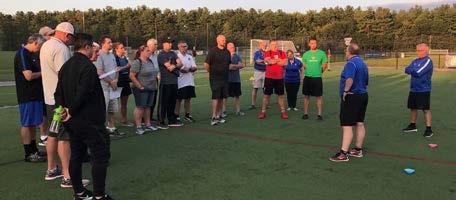
4 minute read
Improving the Soccer Culture in MA
Welcome back to another energized soccer season. Throughout the almost 2 year hiatus of covid, we all struggled to keep the game of soccer in the spotlight. MA Youth Soccer provided resources for how to keep children safe and involved in the game at any level possible. We provided activities which allowed children to safely play in and around the house with their parents/guardians and siblings. We also conducted virtual player, coach, parent, referee and administrator workshops to help maintain a connection to the game. Now that we are back on the field, we hope to see these initiatives having a positive influence on training and the value of game-like activities that emulate the child’s game day experience. We have seen the true desire of children to be outside playing soccer again. Our next step is to make their experience even better.
We are excited to see the number of player participants exceeding pre-covid numbers. Many of your town and club’s coaches have been hard at work reestablishing our state’s soccer culture. During the pandemic, over 800 coaches participated in grassroots courses. This past year, almost 650 more coaches have earned a grassroots coaching license. Many of the coaches mentioned above were not coaching teams or involved in games, they simply took advantage of the opportunity to improve their soccer readiness when they could get back on the field.
The US Soccer grassroots coach education methodology encourages coaches to adopt a “player first” mentality. At its core, the player is at the forefront of every decision the coach makes. This would include starting line up, playing time, players learning different positions as well as what is important to each child off the field. The coaches have explored a deeper understanding into what is important for each child and how to keep them involved in the game of soccer now and for years to come. Fun, development and a sense of belonging are the ingredients to maintaining involvement in the sport. What may seem as a straightforward task, building rapport with each player can be challenging because their desire to play and their needs may not be in line with why the adult/coach in the program.
The popular Apple TV series, Ted Lasso, is a great example of how a coach, who is in the process of learning the game, can achieve success with the team by creating a player first culture. As much as many of us watch the show for its comical take on English soccer, there are lessons taught that resonate in the youth game. The game results in his environment are important but coach Lasso still prioritizes the relationship he has created with the individuals over the “win at all cost” approach. Clearly, the players do not enjoy losing but they do enjoy and work hard in the environment they are in. Fear and intimidation are not the motivators in this environment. Instead, coach Lasso uses a caring and understanding approach.
Creating a Positive Culture.
We support US Soccer and follow the coaching methodology of Play, Practice, Play (P-P-P). This methodology teaches children the game of soccer through the game of soccer. P-P-P is intentionally designed to bring the game back to the children. Many of the coaches in your organization who have participated in these courses have been putting the methodology to the test. The responses they have received from the children in the program have been quite positive. Children want to play and the coaches hear them. Not only does this methodology keep the children active and engaged, the coaches who have reached out to me feel much more confident in conducting a training session and guiding the children to the solution instead of lecturing to them. They have commented on how much more supportive of the children they have become during games. They have also experienced a calmer relationship with opposing coaches. We could not be more delighted to hear all the positive responses from our membership.
What does this mean for us?
Studies suggest that by creating a culture which allows children to experience enjoyment in a safe environment where they are treated with dignity and respect while developing a better understanding and abilities in the game of soccer will keep them involved in the game for longer periods. The 800+ coaches mentioned above, as well as all the coaches who have taken grassroots courses over the past several years, are pioneering a new generation. This concept of leading the children down this path, and helping them find the game within each child is paying dividends. Finally, many children are receiving a consistent message about the game. These children are learning a common language. As you walk past soccer fields, children are playing and engaged in discussion instead of standing in line waiting to receive instruction. This is what the game should look like.
We are so thankful for all the organizations and coaches who are supporting a common methodology for our grassroots players through Play-Practice-Play. For all the coaches who have not joined the movement yet, please click on the Play, Practice, Play link above then reach out to your organization to learn more about how you can help us improve the soccer culture in your town and across Massachusetts. By creating a culture where every child is coached by a Licensed Soccer coach we can stem the tide of dropout from the game. Research is telling us that 72% of Youth Soccer players are under 12 years of age so only 28% continue on through the 11 v 11 game. What does that say about the cultures that we have created and more importantly what can WE do to keep our players in the game?






